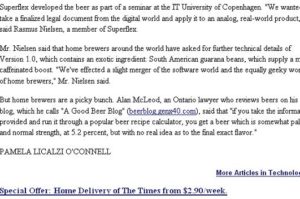So there I am, in the last paragraph 14th story in The New York Times, Business Section, Media and Advertising page, web edition index at 6:37 am Monday morning with the precious URL, all live and linky:

No seized web site or anything. No referrers yet as I can see. Oh well. Wait for the entire workforce of New York City to get to work and turn on their computers to slack off for the morning by flipping through the web edition, I suppose…
It was an interesting process being interviewed via email by the reporter who has lots of web industry writing experience but not a homebrewer or anything. She noticed this post I made January on the nutty idea of an “open source beer”. Too bad they did not use the full quote – which I thought was really helpful – but, true, would have needed a separate section:
I have not tried the beer but think from what is provided that I would not like to try to make it or drink it. Making the beer would be difficult for most homebrewers given the volumes provided. Most homebrewers brew in lots of 20 litre or perhaps double that but an 80 litre boil as required in this recipe would find the brewer facing over 200 pounds of boiling sticky sugar syrup needing transferring by the brewer, a near impossible task in the average kitchen. By contrast, even the small end of the microbrewing scene expects an entry point at the 5 or 7 barrel scale of brewery. One barrel of beer is about 170 litres. Here is some information from the brewery manufacturer DME: which may help understand the scale: http://www.dmeinternational.com/brewing/brewbup/naturalbrew.html. So it is unclear for whom this scale of recipe is devised. Recipes can be scaled up or down but you might want to start with a point that is useful – or even safe – for one type of brewer or another.
That being said, there are issues with the ingredients, too. Beer is basically made of four things: water, yeast, hops and malt. In this recipe, there is detail provided about only hops and malt. As a result, it the same ingredients were used and made with the soft water of Dublin or the hard water of Burton-upon-Trent, England, the resulting products would be very different. These effects can be reproduced by adding water treatments which mimic one location or another. But without any guidance as to water quality, there is a great deal of variation left to the imagination of the brewer. The same is the case of the yeast. The recipe does not tell us whether it is lager yeast or ale yeast, the two general hemispheres of the beer world. Further, it does not state which of sub-type might be used. Consider this web page of a homebrew supplier which offers 33 ale yeasts and 16 for lager, aside from the 18 for the specialized wheat and Belgian styles of beer: http://www.paddockwood.com/index.php. Selection among these yeasts will greatly affect the outcome of the brewing process. But no guidance is given.
Where there is some guidance, we are still uncertain. We are told that “1 kg of caramel malt” is required. That usually defines a class of malts with a sugary aspect but they differ in the taste they impart according, among other factors, to the degree they are roasted. As a result, a pale crystal malt may give a slight nuttiness to a beer where a dark one provides a strong raisiny flavour. Just saying “caramel malt” in not specific enough. Similarly, the recipe includes 4 kg of sugar but we are not told if it is corn or cane, light yellow or dark demarara or even whether Belgian candi sugar is to be used. Sugar is not sugar is not sugar.
So in the end it is very difficult to determine what a brewer might do with the recipe as it is really only part of a recipe. If you take the information provided and run it through a popular beer recipe calculator used by homebrewers for planning you get a beer which is somewhat pale and normal strength at 5.2% but a bit cloying due to the moderate hops and likely richness of some residual sugars. It would also have no to very rich yeastiness with anything from a slight nuttiness to a strong raisin flavour. Here are the results from when I ran the test: http://hbd.org/cgi-bin/recipator/recipator?6074722#tag. Except for the odd ingredient “300 g Guarana beans” this could be half the beers I have ever encountered depending on how the unstated variables are addressed by the particular brewer. It is interesting to note that guarana bean is included in the new Budweiser product, B-to-the-E: this author does not find that product very pleasant: http://www.wisinfo.com/postcrescent/news/beerman/beer_20024917.shtml
I do go on, don’t I.

